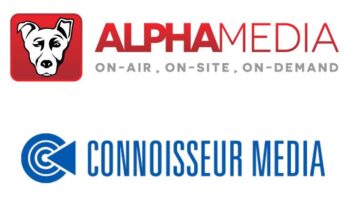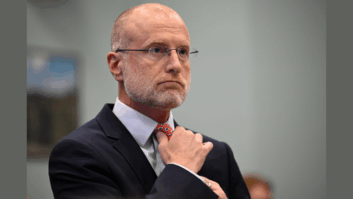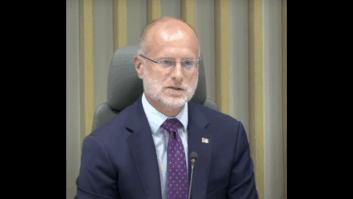
In a wide-ranging conversation that touched on everything from the upcoming incentive auctions to the influence of comedian John Oliver, Consumer Technology Association CEO Gary Shapiro led a one-on-one discussion with Federal Communications Chairman Tom Wheeler on Wednesday at CES 2016.
The always-animated chairman extolled the range of connected products being exhibited on the show floor, giving a particular shout out to those products connected via broadcast spectrum.
“All you have to do is go down to the floor. The name of the game is connected,” Wheeler said. “So how do we make sure that we continue to do the kinds of things that we were doing last year,” referring to FCC actions that have taken place in the last year, including the adoption of the Open Internet proceeding and the AWS-3 spectrum auction.
“How do you continue that? You continue that with more spectrum,” he said, extolling the opportunities available to the industry via the looming broadcast spectrum auction set for March 29 of this year.
“For the first time in the world, we’re going to do a simultaneous purchasing of spectrum, rebranding of spectrum and re-auctioning of spectrum,” he said. “And all this happen in quasi-real time. It’s a huge undertaking.”
Shapiro threw Wheeler an easy softball question by asking if any broadcasters at all will show up for this auction.
“You’re going to see a spectrum extravaganza,” Wheeler responded. “There’s lots of interest in selling and lots of interest in buying. It’s going to be transformational and it’s essential to the kinds of things that are going on downstairs [on the CES show floor].”
And what if no one wants to bid? Shapiro asked, eliciting some snickers from the audience.
The market has already indicated its interest in this process, Wheeler said. “What’s exciting here is that this is not bureaucrats sitting down and divvying things up. This is the market deciding what is the best use of the spectrum. This is creating opportunities not just for wireless carriers but for broadcasters.”
The best outcome, Wheeler said, is that lots of spectrum is being sold to lots of wireless carriers. Worst-case scenario: “That it all blows up,” he said. “But I’ll go to the bookies and put my odds against that.”
The National Association of Broadcasters was not so sanguine. “NAB believes the best auction outcome would be one that allows those stations that choose to exit the business a chance to sell out or channel share, but which preserves a robust local TV business for those stations choosing not to participate,” Dennis Wharton, NAB executive vice president of communications, said after the session. “In our view, there is no higher and better use of spectrum than a free and local TV service serving tens of millions of Americans every day with news, entertainment and lifeline information.”
Wheeler said that interest in the auction from both big networks and smaller-market broadcasters has been encouraging.
Shapiro brought up the concerns that broadcasters have had with the upcoming auction; Wheeler said the industry is coming around. “I think a lot of broadcasters early on thought that this was some kind of threat,” Wheeler said. “First, it’s voluntary. Second, it’s a way of rethinking your business.”
Wheeler said that spectrum currently reserved for government use is also on the table. “The key concept in a digital environment is sharing,” he said. What licensees, including the government, must realize this that spectrum reallocation isn’t a grab but rather a sharing opportunity, he said. “The digital future is a future that enables spectrum sharing,” Wheeler said.
Wheeler touched on the need to have more Regular Joe consumers in on FCC debates. That’s where John Oliver comes into play. “Here’s what he did, he got people interested,” Wheeler said of the host of the program “Last Week Tonight,” who delivered a 13-minute monologue in March on net neutrality. That piece has been viewed more than 8.5 million times on YouTube. “John Oliver took the ultimate arcane issue, Title II, and made it into something that got people interested,” Wheeler said, adding that the FCC received more than 4 million comments from consumers regarding the net neutrality issue.
The chairman also touched on privacy and security. Those issues were picked up on in the second half of the session by Federal Trade Commission Chairwoman Edith Ramirez, who also participated in a one-on-one conversation with Shapiro. Video is below, courtesy of the Consumer Technology Association.







